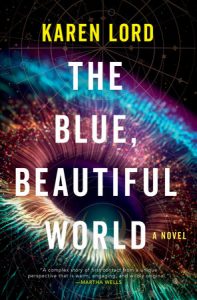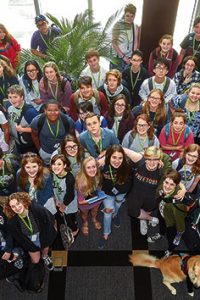Karen Lord: First Contact
KAREN LORD was born May 22, 1968 in Barbados. She attended secondary school at Queen’s College, and later attended the University of Toronto. She earned a master’s degree in science and technology policy at Strathclyde University in Glasgow, and got her doctorate in the sociology of religion at Bangor University in Wales. She has traveled widely, taught physics in school, trained soldiers, and worked in the foreign service. She lives in Barbados.
Lord’s first novel Redemption in Indigo appeared in 2010 to great acclaim, winning the Crawford Award for best first fantasy, a Parallax Award, a Mythopoeic Award, and the Golden Tentacle in the Kitschies Awards. Sequel Unraveling appeared in 2019. The Best of All Possible Worlds (2013), The Galaxy Game (2015), and her latest, The Blue, Beautiful World (2023), are all set in the same fictional universe. She also edited New Worlds, Old Ways: Speculative Tales from the Caribbean (2016).
Excerpt from the interview:
 We’re not always vocal about what writing costs us, but for quite a lot of us, the space for getting that first idea seed and really breaking it to the point where you can start writing it, is a space that needs to be sacred. It’s not work you can do while you’re putting yourself out there and putting on a persona – especially if you’re not an extrovert. Besides doing interviews and panels, it’s also about writing essays, because you know how it goes: you always write something like, ‘Here are five books that are cool, and here is a little thing I want to talk about.’ All of that non-fiction takes its own fuel from you, and you don’t have a chance, really, to sit down and cuddle with your manuscript in progress while that’s happening.
We’re not always vocal about what writing costs us, but for quite a lot of us, the space for getting that first idea seed and really breaking it to the point where you can start writing it, is a space that needs to be sacred. It’s not work you can do while you’re putting yourself out there and putting on a persona – especially if you’re not an extrovert. Besides doing interviews and panels, it’s also about writing essays, because you know how it goes: you always write something like, ‘Here are five books that are cool, and here is a little thing I want to talk about.’ All of that non-fiction takes its own fuel from you, and you don’t have a chance, really, to sit down and cuddle with your manuscript in progress while that’s happening.
“Because so many things have burned me over my career, I’m always super cautious when I talk about things in process. It’s not because I don’t have faith in them, but just because we’ve seen so many things that looked promising just implode for reasons that are totally beyond our control. I don’t want to talk about things and jinx them in their early stages.
“Since we are, at the time of this conversation, still in the writers’ strike in Hollywood, with people asking whether an AI can write the next hit TV series or novel for you, let me take this opportunity to say: people, you need to appreciate your creatives, and you need to understand they have to eat. With the Simon & Schuster merger trial, there were authors on the stand saying, ‘In those days, advances really could keep you fed while you worked on the books.’ Wow, yeah – that’s what an advance was supposed to do! If you want to have good material, you have to understand, also, that writers evolve – not all of us come out with a big, splashy debut, just the best thing ever, and then keep coasting from there. A lot of people need to grow, and the only way they grow is if time is invested in them. You take your person who is a decent midlister, and you invest in them, and you let them keep producing books and evolve as a writer. And evolving as a writer isn’t just about paying – it’s also about allowing writers to take risks, damn it! No one compels me to produce the same book every time. I will not do it. I will get bored, and I will not grow as a writer.
“Instead of the mass production of a monoculture, I want people to think of a writing career as something that needs to be groomed and tended, but still allowed to grow a little wild, occasionally. We need to look at what we value. It should not be simply volume of content, or even newness of content – the new name, and so forth – and it definitely should not be celebrity.
“I don’t think we’re going to lose to AI. Ted Chiang had an interesting article, and an interview more recently, about AI. The article was in The New Yorker and it was titled ‘ChatGPT Is a Blurry JPEG of the Web.’ The programs have scraped all that’s already there and are just regurgitating it in interesting ways, okay? There’s going to come a point where we don’t want just the regurgitation because: What is art? This is not a definitive definition coming from me, but I’ll tell you my view as a creative: I’m looking at all the books I have read in my life; I’m looking at the interactions that I’ve had; I’m looking at my country’s history; my country’s literary canon; I’m in communication, in a sense, with my ancestors and those that have gone before, but I’m also looking for something new. Part of the newness is breaking things down into little bits and assembling them into a new thing, which is what AI can do. But part of it is bringing things to birth, which is not as simple as just breaking things down. Sometimes, we can bring things to birth precisely because it’s a new era. We can look at things differently. I don’t want to get mystical, but let’s get mystical, all right? Half the time, as artists, we don’t know how we do what we do, and if I can’t even explain how I come up with a particular idea, how can AI do it?
“When I was at a recent workshop, I told a couple of family stories to one of the participants who was sharing family stories. There was this story I had heard so many times, and told it once or twice as well, but at the end of my telling it to her, even after all those tellings, I said, ‘Love is a haunting.’ I was like, ‘Whoa! Wow! Where did that come from?’ That was one of the reasons why I said, ‘I’ve got to get out more’, because if I hadn’t had the chance to tell that story anew to someone who I had never spoken to before, who was a complete stranger, I wouldn’t have had that epiphany. And I had to have that epiphany.
“As a writer, you know when it clicks, and you know when it’s not clicking. Speak to any writer who has trunked a story or a novel. As much as you may learn from things that click, it’s when things don’t click that you really learn to have a bit of humility about the whole process. Because we don’t fully understand. Whenever I’m teaching, facilitating a writing workshop, I try to make people understand that. It’s all very well to teach craft, the nuts and bolts of how the grammar works and how story structure works, the various techniques you can use. But, ultimately, there is a certain ineffable mystery that we can’t pass on. You’ve got to find it inside you and bring it out; we can’t do that for you.”
Interview design by Francesca Myman. Photo by Risée Chaderton-Charles for eye.one.visuals.
Read the full interview in the August 2023 issue of Locus.
 While you are here, please take a moment to support Locus with a one-time or recurring donation. We rely on reader donations to keep the magazine and site going, and would like to keep the site paywall free, but WE NEED YOUR FINANCIAL SUPPORT to continue quality coverage of the science fiction and fantasy field.
While you are here, please take a moment to support Locus with a one-time or recurring donation. We rely on reader donations to keep the magazine and site going, and would like to keep the site paywall free, but WE NEED YOUR FINANCIAL SUPPORT to continue quality coverage of the science fiction and fantasy field.
©Locus Magazine. Copyrighted material may not be republished without permission of LSFF.








